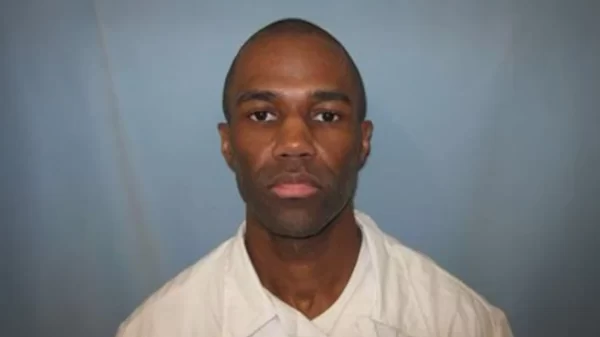|
Getting your Trinity Audio player ready...
|
On February 6, 2025, at 6:36 p.m., the State of Alabama executed 52-year-old Demetrius Terrence Frazier at the William C. Holman Correctional Facility in Atmore. Frazier was sentenced to death for the 1991 rape and murder of 41-year-old Pauline Brown in Birmingham. His execution marked Alabama’s fourth use of nitrogen hypoxia as a method of capital punishment—a process that remains as controversial as it is untested.
In the hours before his execution, Frazier refused his standard meals but requested a final meal of burritos, a chicken chalupa, tacos, chips and dip, and Mountain Dew. His last words included an apology: “First of all, I want to apologize to the family and friends of Pauline Brown. What happened to Pauline Brown should have never happened.” He also criticized Michigan Governor Gretchen Whitmer for not intervening in his case, adding, “I love everybody on death row. Detroit Strong.”
Witnesses reported that Frazier exhibited visible signs of distress during the execution, grimacing and quivering as pure nitrogen gas was pumped into a mask strapped to his face. The gas flowed for approximately 15 minutes. Alabama Corrections Commissioner John Q. Hamm claimed Frazier lost consciousness quickly and attributed his movements to involuntary reactions. Critics, however, argue that what Alabama calls “involuntary reactions” appear more like the unmistakable struggle of a man suffocating to death.
Alabama Governor Kay Ivey, said of the execution , ““In Alabama, we enforce the law. You don’t come to our state and mess with our citizens and get away with it. Rapists and murderers are not welcome on our streets, and tonight, justice was carried out for Pauline Brown and her loved ones. I pray for her family that all these years later, they can continue healing and have assurance that Demetrius Frazier cannot harm anyone else.”
Frazier’s case raised legal questions beyond Alabama’s borders. He was serving a life sentence in Michigan for the 1990 murder of 14-year-old Crystal Kendrick when he confessed to Brown’s murder in Alabama. Michigan, a state without the death penalty, transferred him to Alabama in 2011, effectively sending him to his execution. His attorneys argued that he should have been returned to Michigan under legal agreements between the states, but those appeals were unsuccessful. Following the execution, Frazier’s remains were released to the Escambia County Coroner and transported to the Alabama Department of Forensic Sciences’ Mobile Lab for a postmortem examination.
Alabama has a long and deeply flawed history with capital punishment. The state carried out its first execution in 1812. From 1812 to 1927, hanging was the primary method before the introduction of the electric chair—nicknamed “Yellow Mama”—which remained in use until lethal injection became the standard. Since 1976, Alabama has executed 78 individuals and exonerated nine, a disturbing error rate that underscores the fallibility of its justice system. As of January 2025, Alabama had 158 inmates on death row, ranking fourth in the nation.
The use of nitrogen hypoxia has only intensified concerns about the state’s approach to capital punishment. Proponents claim it is a painless alternative to lethal injection, but the reality is far more unsettling. Witnesses to previous nitrogen executions have described inmates convulsing, shaking, and gasping for air—experiences that hardly resemble the “humane” process Alabama officials claim. Frazier’s execution was no exception. Despite mounting criticism, Alabama remains committed to using this untested method, pressing forward with what it calls justice but what others see as little more than state-sanctioned cruelty.























































